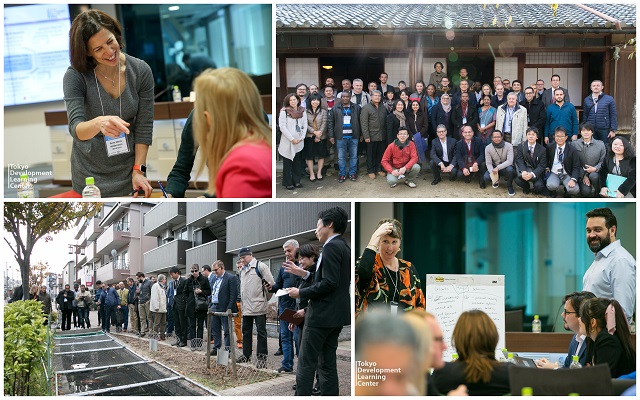Technical Deep Dive on Information Technologies for Improving Land Administration Services
World Bank Tokyo Development Learning Center (TDLC)
In collaboration with Land Thematic Group and Geospatial Community of Practice (CoP)
Tokyo and Kobe, Japan | November 13-17, 2017

Photo: WB TDLC
November 13 - 17, 2017, Tokyo, Kobe - TDLC hosted the Technical Deep Dive (TDD) on Information Technologies for Improving Land Administration Services. Approximately 50 participants from 10 countries (Colombia, Croatia, India, Laos, Lebanon, Liberia, Madagascar, Mozambique, Palestine, and Poland) actively engaged in this TDD. This week-long learning event included engaging sessions led by Japanese, Lithuanian, and Singaporean experts in addition to the World Bank led sessions. During the week the participants traveled to Kobe City and learned their application of IT to gain efficiencies in Land Administration.
Anna Wellenstine, Director of GSURR at the World Bank emphasized in her opening remarks, “Land is at the center of development challenges. Eliminating poverty and boosting shared prosperity; increasing food security; facilitating urbanization; addressing climate change; increasing resilience and reducing fragility; and reducing inequality and exclusion of vulnerable groups all depend on secure land rights.”
Land and geospatial information systems play a critical role in people’s lives, such as disaster preparedness and emergency response, and properly functioning land administration services are critical for the development and growth of any country to protect land rights of all the residents, especially women and vulnerable populations. Secure tenure enables value-based property taxes, which can contribute significantly to local government revenues and services.
Oftentimes clients face resistance from local stakeholders, capacity deficits, lack of adequate funding, weak institutional coordination, and lack of standard methodology for efficient and effective systematic land regularization including modern technologies. TDD provides an ideal forum for clients to learn not just from international experts but also from each other.
Land use policies, geospatial information technologies, lessons on land administration, cadastral function and taxation were topics showcased by practitioners and experts from Japan, Lithuania and Singapore. Key learnings from them are as follows:
An essential use of GIS data in Japan is for disaster preparedness. Sharing the data among agencies and their coordination are the key. The central government calculates the risks of disaster, prefectures scrutinize the content, and cities apply them on their local context and create a disaster prevention plan.
In “Doing Business 2017” report, Lithuania was listed as second among 190 countries in the category of efficiency of property registration. Developing integrated data system, strong political will, coordination among public, science and business and communication to support the administration underpinned Lithuanian success.
Singapore’s geospatial development illustrated how the top-down structure with strong political support and changing stakeholder’s mindset of sharing the data by showcasing the benefit brought its success in development.
The intense learning week of TDD concluded by creating and sharing action plans for each country. The major takeaways raised during the presentation were: legal framework, willingness of institutions/people for data gathering and sharing, development of integrated data system is necessary for land administration, and any land solutions must be fit for purpose.
Presentations, Materials, and City Action Plan Presentations attached below:
- Day 1-1 Land Administration at the World Bank: An Expanding Agenda
- Day 1-2 Land, Economy, and Growth: The Big Picture
- Day 1-3 Japan’s Land Policies
- Day 1-4 Utilizing Geospatial information in Japan
- Day 1-5 GSI: Japanese standards for geographic information
- Day 2-1 Effective Land Administration – Law, Regulation, Institutions and Technology Challenges: LITHUANIA EXPERIENCE
- Day 2-1 Material 1
- Day 2-1 Material 2
- Day 2-1 Material 3
- Day 2-1 Material 4
- Day 3-1 Our Experience to share - What have Kobe learned through the Great Hanshin-Awaji Earthquake?-
- Day 4-1 Land TDD Supplemental Information
- Day 4-2 TDLC’s Operational Support
- Day 5 Action Planning Presentations
- Agenda


Blog » News, Materials and Presentations: TDD on Information Technologies for Improving Land Administration Services, 13-17 Nov 2017
News, Materials and Presentations: TDD on Information Technologies for Improving Land Administration Services, 13-17 Nov 2017
Technical Deep Dive on Information Technologies for Improving Land Administration Services
World Bank Tokyo Development Learning Center (TDLC)
In collaboration with Land Thematic Group and Geospatial Community of Practice (CoP)
Tokyo and Kobe, Japan | November 13-17, 2017
Photo: WB TDLC
November 13 - 17, 2017, Tokyo, Kobe - TDLC hosted the Technical Deep Dive (TDD) on Information Technologies for Improving Land Administration Services. Approximately 50 participants from 10 countries (Colombia, Croatia, India, Laos, Lebanon, Liberia, Madagascar, Mozambique, Palestine, and Poland) actively engaged in this TDD. This week-long learning event included engaging sessions led by Japanese, Lithuanian, and Singaporean experts in addition to the World Bank led sessions. During the week the participants traveled to Kobe City and learned their application of IT to gain efficiencies in Land Administration.
Anna Wellenstine, Director of GSURR at the World Bank emphasized in her opening remarks, “Land is at the center of development challenges. Eliminating poverty and boosting shared prosperity; increasing food security; facilitating urbanization; addressing climate change; increasing resilience and reducing fragility; and reducing inequality and exclusion of vulnerable groups all depend on secure land rights.”
Land and geospatial information systems play a critical role in people’s lives, such as disaster preparedness and emergency response, and properly functioning land administration services are critical for the development and growth of any country to protect land rights of all the residents, especially women and vulnerable populations. Secure tenure enables value-based property taxes, which can contribute significantly to local government revenues and services.
Oftentimes clients face resistance from local stakeholders, capacity deficits, lack of adequate funding, weak institutional coordination, and lack of standard methodology for efficient and effective systematic land regularization including modern technologies. TDD provides an ideal forum for clients to learn not just from international experts but also from each other.
Land use policies, geospatial information technologies, lessons on land administration, cadastral function and taxation were topics showcased by practitioners and experts from Japan, Lithuania and Singapore. Key learnings from them are as follows:
An essential use of GIS data in Japan is for disaster preparedness. Sharing the data among agencies and their coordination are the key. The central government calculates the risks of disaster, prefectures scrutinize the content, and cities apply them on their local context and create a disaster prevention plan.
In “Doing Business 2017” report, Lithuania was listed as second among 190 countries in the category of efficiency of property registration. Developing integrated data system, strong political will, coordination among public, science and business and communication to support the administration underpinned Lithuanian success.
Singapore’s geospatial development illustrated how the top-down structure with strong political support and changing stakeholder’s mindset of sharing the data by showcasing the benefit brought its success in development.
The intense learning week of TDD concluded by creating and sharing action plans for each country. The major takeaways raised during the presentation were: legal framework, willingness of institutions/people for data gathering and sharing, development of integrated data system is necessary for land administration, and any land solutions must be fit for purpose.
Presentations, Materials, and City Action Plan Presentations attached below: